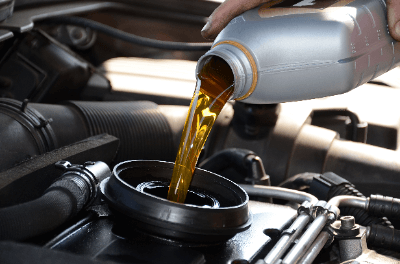What Is Engine Oil?

Engine Oil is oil used to lubricate and cool the engine.
It is used to reduce wear and friction by preventing direct contact between engine parts and to maintain engine performance by providing a cooling effect.
Regular replacement of Engine Oil is very important to ensure that the product in which the engine is installed remains in good condition and performs as it should. Engine Oil has a variety of functions, but is sometimes referred to simply as lubricating oil because of its primary role as a lubricant.
Uses of Engine Oil
Engine Oil is almost always used in equipment that has an engine. Inside the engine, parts rotating at high speeds come into contact with each other, and heat is generated by the friction. Engine Oil absorbs this heat and prevents wear by reducing contact between parts.
Engine Oil is used in a wide variety of equipment. Typical examples are automobile and motorcycle engines. Engine oil maintains engine performance by preventing parts from contacting each other and providing a cooling effect. It also serves to protect the engine from contaminants.
They are also used in ship and aircraft engines. Marine engines are subject to high temperatures due to prolonged use, so they must be durable at high temperatures. Aircraft engines need to withstand use at high altitudes, which may require high-viscosity oil.
In addition, it is sometimes used in machine tools and construction machinery.
Principle of Engine Oil
The working principles of Engine Oil are:
1. Lubrication
Engine Oil reduces friction between metal parts and reduces wear. Lubrication occurs when the oil penetrates the gaps between the piston and cylinder parts, thereby facilitating the smooth operation of the machine.
2. Sealing
A film of oil between the piston and cylinder seals the fuel gases during the compression and combustion processes, producing energy efficiently. Increased sealing also leads to increased engine power and fuel economy. One factor that contributes to a better seal is the viscosity of the Engine Oil.
Viscosity is expressed in terms of Winter (W), which is the limit for use at low temperatures, and 100°C, which is the viscosity of the oil at 100°C. The viscosity of an engine oil is expressed as a number. The viscosity of Engine Oil used in general passenger cars is about 10W-40 for high products and 0W-20 for low products.
Low viscosity oil is characterized by the fact that the oil is soft even at low temperatures and has good starting performance, which improves fuel efficiency at low temperatures. High viscosity oil is characterized by its ability to form a firm oil film and protect the engine from damage caused by friction even at high speeds when the Engine Oil is running at high temperatures.
3. Cooling
Engine Oil absorbs the heat and dissipates it to the outside, thereby demonstrating its cooling effect. Generally, Engine Oil is circulated, and heat is discharged to the outside by circulating heat radiation. For equipment that generates a lot of heat, a separate heat exchanger or similar device may be installed externally.
4. Cleaning
Engine Oil cleans dirt inside the engine and keeps the engine clean. However, since there is a limit to its cleaning capacity, Engine Oil should be changed periodically.
5. Rust Prevention
Engine Oil also serves as an anti-rust agent for the engine. It forms a film on the inside of the engine and protects the equipment from rust by blocking the adhesion of oxygen.
Types of Engine Oil
Engine Oil has a base oil, to which chemical synthetic oil and additives are added to condition its performance while removing impurities. Engine Oil can be divided into three types: mineral oil, partially synthetic oil, and chemically synthesized oil, depending on the amount of these additives.
Mineral Oil is the least expensive Engine Oil available and is refined by removing impurities from crude oil. Mineral oil is not suitable for high-speed driving where the engine is subjected to severe stress: it is better suitable for general passenger vehicles.
Partially synthetic oils are made by adding high-quality synthetic oil to mineral oil and offer an excellent balance between quality and price.
100% synthetic oil is a high quality oil with impurities removed to the utmost limit and additives that protect the Engine Oil. It has the performance to withstand harsh conditions such as motor sports.